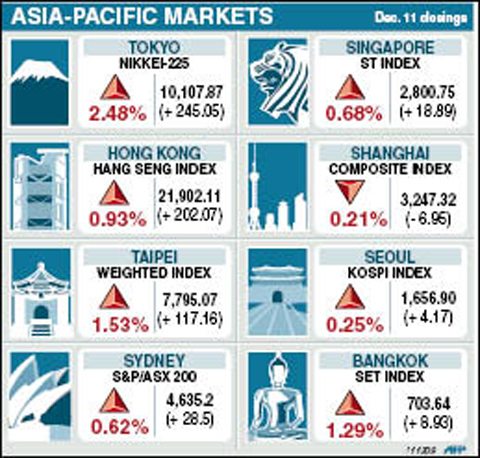Asian stocks fell for the third week in four, led by Japanese banks, after the nation’s economy grew more slowly than estimated. Technology shares rose on optimism a US economic recovery will bolster demand.
Mitsubishi UFJ Financial Group Inc, Japan’s biggest publicly traded bank, sank 8.3 percent. Santos Ltd, Australia’s third-biggest oil and gas producer, fell 7.7 percent after saying output next year may drop. Japanese chipmaker Elpida Memory Inc surged 9.8 percent in Tokyo as US jobless claims fell to a one-year low. Maanshan Iron & Steel Co, the No. 2 Chinese mill listed in Hong Kong, climbed 9.8 percent after China’s industrial production increased.
“Emerging markets will continue to lead growth in the world economy next year, and companies that can make money in those markets will remain in the spotlight,” said Yoshinori Nagano, a senior strategist in Tokyo at Daiwa Asset Management Co.

The MSCI Asia-Pacific Index fell 0.4 percent this week to 119.68. The gauge’s 5.5 percent gain the previous week was its steepest climb in seven months. Japan’s Nikkei 225 Stock Average added 0.9 percent this week, while South Korea’s KOSPI Index climbed 2 percent.
Hong Kong’s Hang Seng Index fell 2.7 percent and the Shanghai Composite Index retreated 2.1 percent. Australia’s S&P/ASX 200 Index lost 1.4 percent, even after a government report showed the country’s jobless rate dropped.
Mitsubishi UFJ dropped 8.3 percent to ¥455. Sumitomo Mitsui Financial Group Inc, Japan’s second-biggest bank by value, lost 6.6 percent to ¥2,710. Mizuho Financial Group Inc, the No. 3, sank 5.9 percent to ¥159.
Elpida Memory, Japan’s biggest computer memory-chip maker, advanced 9.8 percent to ¥1,331. A US government report this week showed the four-week average number of Americans filing for jobless benefits declined to a one-year low.
Taiwanese share prices are expected to gain next week thanks to optimism about relations with China ahead of high-level cross-strait talks, dealers said on Friday.
Companies with strong interests in China are expected to attract buying on hopes that the meeting from Dec. 21 to Dec. 23 will yield concrete measures on trade and investment, they said.
But with many foreign institutional investors turning quiet ahead of Christmas, turnover may be slight and the market is likely to face strong pressure at 7,900 points next week, dealers said.
For the week to Friday, Taipei’s weighted index rose 144.16 points, or 1.88 percent, to 7,795.07. That came after a 2.14 percent increase a week earlier.
“Old-economy stocks have positioned themselves well for a take-off after recent consolidation. The talks [with China] could serve as a catalyst,” Grand Cathay Securities (大華證券) analyst Mars Hsu said.

WAITING GAME: The US has so far only offered a ‘best rate tariff,’ which officials assume is about 15 percent, the same as Japan, a person familiar with the matter said Taiwan and the US have completed “technical consultations” regarding tariffs and a finalized rate is expected to be released soon, Executive Yuan spokeswoman Michelle Lee (李慧芝) told a news conference yesterday, as a 90-day pause on US President Donald Trump’s “reciprocal” tariffs is set to expire today. The two countries have reached a “certain degree of consensus” on issues such as tariffs, nontariff trade barriers, trade facilitation, supply chain resilience and economic security, Lee said. They also discussed opportunities for cooperation, investment and procurement, she said. A joint statement is still being negotiated and would be released once the US government has made

Authorities have detained three former Taiwan Semiconductor Manufacturing Co (TMSC, 台積電) employees on suspicion of compromising classified technology used in making 2-nanometer chips, the Taiwan High Prosecutors’ Office said yesterday. Prosecutors are holding a former TSMC engineer surnamed Chen (陳) and two recently sacked TSMC engineers, including one person surnamed Wu (吳) in detention with restricted communication, following an investigation launched on July 25, a statement said. The announcement came a day after Nikkei Asia reported on the technology theft in an exclusive story, saying TSMC had fired two workers for contravening data rules on advanced chipmaking technology. Two-nanometer wafers are the most

NEW GEAR: On top of the new Tien Kung IV air defense missiles, the military is expected to place orders for a new combat vehicle next year for delivery in 2028 Mass production of Tien Kung IV (Sky Bow IV) missiles is expected to start next year, with plans to order 122 pods, the Ministry of National Defense’s (MND) latest list of regulated military material showed. The document said that the armed forces would obtain 46 pods of the air defense missiles next year and 76 pods the year after that. The Tien Kung IV is designed to intercept cruise missiles and ballistic missiles to an altitude of 70km, compared with the 60km maximum altitude achieved by the Missile Segment Enhancement variant of PAC-3 systems. A defense source said yesterday that the number of

Taiwanese exports to the US are to be subject to a 20 percent tariff starting on Thursday next week, according to an executive order signed by US President Donald Trump yesterday. The 20 percent levy was the same as the tariffs imposed on Vietnam, Sri Lanka and Bangladesh by Trump. It was higher than the tariffs imposed on Japan, South Korea and the EU (15 percent), as well as those on the Philippines (19 percent). A Taiwan official with knowledge of the matter said it is a "phased" tariff rate, and negotiations would continue. "Once negotiations conclude, Taiwan will obtain a better